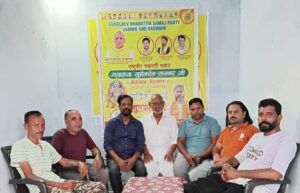Controversy Erupts Over Urdu Language Requirement for Naib Tehsildar Posts in JKUT

Jammu, June 11, 2025 – The recent advertisement by the Jammu and Kashmir Services Selection Board (JKSSB) for 75 Naib Tehsildar posts in the Revenue Department of Jammu and Kashmir Union Territory (JKUT) has sparked widespread outrage, particularly among aspirants from the Jammu region. The bone of contention is the mandatory requirement of “working knowledge of Urdu” as an eligibility criterion, which many claim discriminates against candidates from Jammu, where Hindi, Dogri, and English are predominantly spoken.
The advertisement, issued under Notification No. 05 of 2025 on June 9, 2025, mandates that candidates must have a graduation degree and a working knowledge of Urdu to qualify for the Naib Tehsildar examination. The syllabus includes two papers: one comprising multiple-choice questions in English and a descriptive Urdu qualifying paper. This requirement has reignited a long-standing debate about linguistic fairness in the region, with critics arguing it disproportionately disadvantages Dogra candidates from Jammu, where Urdu is rarely used outside specific areas.
Allegations of Regional Bias
Aspirants and activists from Jammu have labeled the Urdu requirement as “discriminatory” and a deliberate attempt to sideline candidates from the region.
Social media platforms, particularly X, have been abuzz with posts condemning the decision. One user stated, “Urdu is no longer the sole official language of J&K UT. Making it compulsory for Naib Tehsildar posts is sheer discrimination against Jammu candidates.” Another post highlighted the linguistic diversity of Jammu, noting that “Dogras primarily know Hindi, Dogri, and English—Urdu is nowhere in their daily lives.”
The controversy is particularly heated in light of historical precedent. In 2019, the JKSSB introduced a similar Urdu test for Naib Tehsildar recruitment, which led to the disqualification of many Jammu candidates. Following widespread protests, the Lieutenant Governor’s administration had assured that the Urdu requirement would be scrapped in future recruitments. Critics now question why this criterion has been reinstated despite those assurances.
The Urdu Debate: Practicality vs. Fairness
Proponents of the Urdu requirement argue that it is essential for Naib Tehsildars, who are responsible for handling land and revenue records, many of which remain in Urdu, especially in Kashmir and parts of Jammu’s hilly districts like Doda, Kishtwar, and Bani. One X user defended the criterion, stating, “Most revenue records in J&K are still in Urdu. A Naib Tehsildar needs to read and verify them in the field. Until full digitization and translation happen, this requirement makes sense.” Another post emphasized that Urdu’s role in accessing historical records makes it indispensable, as “officials without Urdu knowledge are effectively illiterate in this context.”
However, critics counter that the digitization of revenue records, a key initiative of the J&K administration, was meant to address this very issue by making records accessible in Hindi and English.
“If revenue records are being digitized and translated, why impose Urdu as a mandatory requirement?”
asked a Jammu-based aspirant.
They argue that the role of a Naib Tehsildar is primarily administrative, and tasks involving Urdu records could be handled by stenographers or translators fluent in the language.
“Translating records is the work of stenographers, not Naib Tehsildars,” one candidate remarked.
Broader Implications: Language as a Barrier
The controversy has raised broader questions about the role of language in public service recruitment. Critics argue that making Urdu mandatory creates an unfair barrier for candidates from linguistically diverse regions like Jammu, where Dogri and Hindi dominate. We have an example of major powers such as Russia in this regard,Russians don’t know English language, is this a barrier in their rise as global powerdes. “Language should not be a barrier for executive positions,” said a protester, urging the administration to adopt a more inclusive, multilingual approach.
Some have even questioned the consistency of the policy, noting that if Urdu knowledge is deemed essential for Naib Tehsildars, similar requirements should logically apply to higher offices like MLAs or ministers. “If Urdu is so critical, why aren’t our legislators required to know it?” asked an aspirant, highlighting what they see as a double standard in the recruitment process.
A Call for Review
The growing discontent has led to appeals for intervention from the Lieutenant Governor’s administration. Aspirants and activists are urging LG Manoj Sinha to review the Urdu requirement and ensure a level playing field for all candidates, particularly those from the Dogra-dominated Jammu region. “The LG administration must revise this criterion to avoid discrimination and ensure fair selection based on merit, not language,” said a protester.
The JKSSB has yet to respond officially to the backlash, but the controversy underscores deep-seated regional tensions in J&K. With the application process underway, the administration faces mounting pressure to address these concerns and restore confidence in the recruitment process. For now, the debate over the Urdu criterion continues to simmer, with candidates awaiting clarity on whether the policy will be revised to reflect the region’s linguistic diversity.
जम्मू-कश्मीर में नायब तहसीलदार के 75 पदों के विज्ञापन पर विवाद: उर्दू भाषा की अनिवार्यता पर जनता में आक्रोश
जम्मू, 11 जून 2025 – जम्मू और कश्मीर सेवा चयन बोर्ड (JKSSB) द्वारा जम्मू-कश्मीर केंद्र शासित प्रदेश (JKUT) के राजस्व विभाग में नायब तहसीलदार के 75 पदों के लिए हाल ही में जारी विज्ञापन ने विशेष रूप से जम्मू क्षेत्र के अभ्यर्थियों में भारी नाराजगी पैदा कर दी है। विवाद का मुख्य कारण पात्रता मानदंड के रूप में “उर्दू का कार्यसाधक ज्ञान” अनिवार्य करना है, जिसे कई लोग जम्मू के उम्मीदवारों के लिए भेदभावपूर्ण मान रहे हैं, जहां हिंदी, डोगरी और अंग्रेजी मुख्य रूप से बोली जाती हैं।
9 जून 2025 को अधिसूचना संख्या 05 के तहत जारी इस विज्ञापन में कहा गया है कि उम्मीदवारों के पास स्नातक डिग्री और उर्दू का कार्यसाधक ज्ञान होना चाहिए। परीक्षा में दो पेपर होंगे: एक अंग्रेजी में बहुविकल्पीय प्रश्न और दूसरा उर्दू का वर्णनात्मक योग्यता पेपर। इस शर्त ने क्षेत्र में भाषाई निष्पक्षता को लेकर पुरानी बहस को फिर से हवा दे दी है, जिसमें आलोचकों का तर्क है कि यह जम्मू के डोगरा उम्मीदवारों को नुकसान पहुंचाता है, जहां उर्दू का उपयोग कुछ खास क्षेत्रों को छोड़कर शायद ही होता है।
क्षेत्रीय भेदभाव के आरोप
जम्मू के अभ्यर्थियों और कार्यकर्ताओं ने उर्दू की अनिवार्यता को “भेदभावपूर्ण” और जम्मू के उम्मीदवारों को हाशिए पर धकेलने का जानबूझकर प्रयास करार दिया है। सोशल मीडिया प्लेटफॉर्म, विशेष रूप से X, पर इस फैसले की निंदा करने वाली पोस्ट्स की बाढ़ आ गई है। एक यूजर ने लिखा, “उर्दू अब जम्मू-कश्मीर केंद्र शासित प्रदेश की एकमात्र आधिकारिक भाषा नहीं है। इसे नायब तहसीलदार पदों के लिए अनिवार्य करना जम्मू के उम्मीदवारों के खिलाफ खुला भेदभाव है।” एक अन्य पोस्ट में जम्मू की भाषाई विविधता पर जोर देते हुए कहा गया, “डोगरा मुख्य रूप से हिंदी, डोगरी और अंग्रेजी जानते हैं—उर्दू उनके दैनिक जीवन में कहीं नहीं है।”
यह विवाद 2019 की घटना की पृष्ठभूमि में और भी तीखा हो गया है, जब JKSSB ने नायब तहसीलदार भर्ती के लिए इसी तरह का उर्दू टेस्ट लागू किया था, जिसके कारण जम्मू के कई उम्मीदवार अयोग्य ठहराए गए थे। व्यापक विरोध के बाद, उपराज्यपाल प्रशासन ने आश्वासन दिया था कि भविष्य की भर्तियों में उर्दू की अनिवार्यता को हटा दिया जाएगा। अब आलोचक सवाल उठा रहे हैं कि इस आश्वासन के बावजूद यह मानदंड क्यों फिर से लागू किया गया।
उर्दू विवाद: व्यावहारिकता बनाम निष्पक्षता
उर्दू की अनिवार्यता के समर्थक तर्क देते हैं कि यह नायब तहसीलदारों के लिए जरूरी है, जो भूमि और राजस्व रिकॉर्ड को संभालते हैं, जिनमें से कई उर्दू में हैं, खासकर कश्मीर और जम्मू के पहाड़ी जिलों जैसे डोडा, किश्तवाड़ और बनी में। एक X यूजर ने इस मानदंड का बचाव करते हुए कहा, “जम्मू-कश्मीर में अधिकांश राजस्व रिकॉर्ड अभी भी उर्दू में हैं। नायब तहसीलदार को इन्हें पढ़ने और सत्यापित करने की जरूरत होती है। जब तक पूर्ण डिजिटाइजेशन और अनुवाद नहीं हो जाता, यह शर्त जरूरी है।” एक अन्य पोस्ट में जोर दिया गया कि ऐतिहासिक रिकॉर्ड तक पहुंच के लिए उर्दू का ज्ञान अपरिहार्य है, क्योंकि “बिना उर्दू ज्ञान के अधिकारी इस संदर्भ में अनपढ़ हैं।”
हालांकि, आलोचकों का कहना है कि जम्मू-कश्मीर प्रशासन की राजस्व रिकॉर्ड के डिजिटाइजेशन की पहल इसी समस्या को हल करने के लिए थी, ताकि रिकॉर्ड हिंदी और अंग्रेजी में उपलब्ध हों। एक जम्मू-आधारित अभ्यर्थी ने पूछा, “अगर राजस्व रिकॉर्ड डिजिटाइज और अनुवादित हो रहे हैं, तो उर्दू को अनिवार्य क्यों किया गया?” उनका तर्क है कि नायब तहसीलदार की भूमिका मुख्य रूप से प्रशासनिक है, और उर्दू रिकॉर्ड से संबंधित कार्य स्टेनोग्राफर या अनुवादक संभाल सकते हैं। एक उम्मीदवार ने कहा, “रिकॉर्ड का अनुवाद स्टेनोग्राफर का काम है, नायब तहसीलदार का नहीं।”
व्यापक निहितार्थ: भाषा एक बाधा के रूप में
इस विवाद ने सार्वजनिक सेवा भर्ती में भाषा की भूमिका पर व्यापक सवाल उठाए हैं। आलोचकों का तर्क है कि उर्दू को अनिवार्य करना जम्मू जैसे भाषाई रूप से विविध क्षेत्रों के उम्मीदवारों के लिए अनुचित बाधा पैदा करता है, जहां डोगरी और हिंदी का प्रभुत्व है। उन्होंने रूस जैसे अन्य प्रमुख देशों का उदाहरण दिया, जिन्होंने भाषा की बाधा को को ही समाप्त कर दिया है रूस क लोग जो की अंग्रेजी भाषा का ज्यादातर इस्तेमाल नहीं करते हैं और अपनी भाषा के आधार पर ही उन्होंने आकाश की ऊंचाइयों को छुआ है और वह वैश्विक प्रभाव वाला देश है। एक प्रदर्शनकारी ने कहा, “कार्यकारी पदों के लिए भाषा बाधा नहीं होनी चाहिए,” और प्रशासन से अधिक समावेशी, बहुभाषी दृष्टिकोण अपनाने का आग्रह किया।
कुछ ने नीति की सुसंगतता पर भी सवाल उठाए, यह तर्क देते हुए कि अगर उर्दू का ज्ञान नायब तहसीलदारों के लिए इतना महत्वपूर्ण है, तो इसे उच्च पदों जैसे विधायकों या मंत्रियों के लिए भी लागू करना चाहिए। एक अभ्यर्थी ने पूछा, “अगर उर्दू इतनी महत्वपूर्ण है, तो हमारे विधायकों को इसका ज्ञान क्यों अनिवार्य नहीं है?” यह भर्ती प्रक्रिया में दोहरे मापदंड को उजागर करता है।
समीक्षा की मांग
बढ़ते असंतोष ने उपराज्यपाल प्रशासन से हस्तक्षेप की अपील को जन्म दिया है। अभ्यर्थी और कार्यकर्ता उपराज्यपाल मनोज सिन्हा से उर्दू की अनिवार्यता की समीक्षा करने और सभी उम्मीदवारों, विशेष रूप से डोगरा-प्रधान जम्मू क्षेत्र के लोगों के लिए समान अवसर सुनिश्चित करने का आग्रह कर रहे हैं। एक प्रदर्शनकारी ने कहा, “उपराज्यपाल प्रशासन को इस मानदंड को संशोधित करना चाहिए ताकि भेदभाव से बचा जा सके और योग्यता के आधार पर निष्पक्ष चयन हो।”
JKSSB ने अभी तक इस विवाद पर आधिकारिक रूप से कोई प्रतिक्रिया नहीं दी है, लेकिन यह विवाद जम्मू-कश्मीर में गहरी क्षेत्रीय तनाव को रेखांकित करता है। आवेदन प्रक्रिया शुरू होने के साथ, प्रशासन पर इन चिंताओं को दूर करने और भर्ती प्रक्रिया में विश्वास बहाल करने का दबाव बढ़ रहा है। फिलहाल, उर्दू मानदंड पर बहस जारी है, और उम्मीदवार इस नीति में संशोधन की प्रतीक्षा कर रहे हैं ताकि क्षेत्र की भाषाई विविधता को प्रतिबिंबित किया जा सके।




